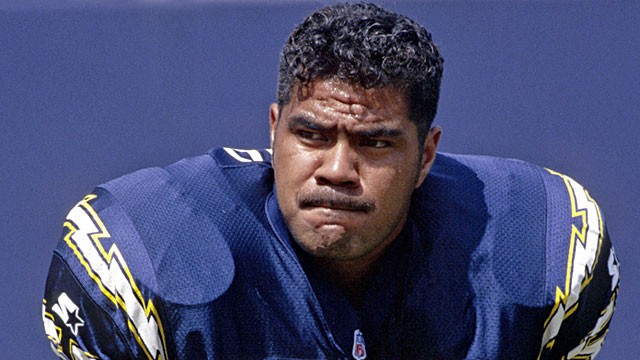 The recent suicide of 12-time Pro Bowl linebacker Junior Seau really knocked me back. I got to know Junior while covering USC and later the San Diego Chargers as a journalist. I found him engaging, cordial and caring.
The recent suicide of 12-time Pro Bowl linebacker Junior Seau really knocked me back. I got to know Junior while covering USC and later the San Diego Chargers as a journalist. I found him engaging, cordial and caring.
Those that place themselves on the high horse have proclaimed Seau a coward for abandoning his children. But those haters are not understanding what it is like going through life with brain damage, which many are saying is a direct result of the numerous hits in football. It will be a while before we know for certain about the condition of Seau’s brain, but his plight has brought renewed focus on a lingering NFL problem.
The fact of the matter it is NFL Commissioner Roger Goodell’s worst nightmare (Seau’s suicide means that we can no longer un-know the fears of its greatest players for an uncertain and potentially horrifying future) is coming true as over 1,800 former players are suing the NFL regarding the league’s conduct in dealing with concussions and head injuries.
We are all to blame! We looked the other way with boxing. We looked the other way with hockey, and we’re going to look the other way again when more data comes in. We tolerate nearly anything that happens to others in pursuit of our own entertainment, and if we are the entertainers, we will tolerate nearly anything that allows us to get paid for it.
But when Seau killed himself, he forced us to accept that a famous and much-beloved figure is now going to be linked to the grisliest aspect of the sport.
You can never say Seau didn’t tell you what he believed comes with the game. Even if his death was completely unrelated to trauma, he feared it enough to choose a spe-cific way of suicide to save what he thought would be the incriminating evidence, and that is information players will have to live with, whether they make the NFL or stop after high school.
Recently, two more former NFL players, defensive tackle Brad Culpepper, 43, and offensive tackle Charley Hannah, 56, are the lead plaintiffs in a lawsuit filed Monday against the National Football League for allegedly misrepresenting and concealing the long-term effects of head injuries.
According to the suit, filed in U.S. District Court in Pennsylvania, the NFL “produced industry-funded, biased research and advocacy that actively misrepresented that concussions and subconcussive head impacts do not (or may not) present serious, life-altering risks.’’
“Currently, Mr. Culpepper suffers from various neurological conditions and symptoms related to multiple head traumas,’’ according to the lawsuit.
“Everyone is focused on concussions instead of repeated blows to the head,’’ Hannah said. “My suit focuses on more subtle brain injuries that are easily recognizable and treatable. To me, the more widespread problems are head injuries that create lifestyle issues for so many former players.’’
The league was steadfast in its response to the recently filed lawsuits.
“The NFL has long made player safety a priority and continues to do so,” league spokesman Greg Aiello said. “Any allegation that the NFL intentionally sought to mislead players has no merit. It stands in contrast to the league’s actions to better protect players and advance the science and medical understanding of the management and treatment of concussions.”
According to Culpepper’s suit, ”This action arises from the pathological and debilitating effects of head injuries and concussions that have afflicted present and former professional football players in the NFL. For decades, the NFL deliberately ignored and actively concealed the information from the plaintiffs and all others who participated in organized football at all levels.’’
The medical examiner’s office said it was awaiting a decision by the family on whether to turn over Seau’s brain to outside researchers for study.
Boston University’s Center for the Study of Traumatic Encephalopathy has analyzed the brains of dozens of former athletes, including that of former Chicago player Dave Duerson, who shot himself last year.
Duerson’s family has filed a wrongful death suit against the NFL, claiming the league didn’t do enough to prevent or treat concussions that severely damaged Duerson’s brain before he died in in February 2011.
Former Atlanta Falcons safety Ray Easterling shot himself last month at age 62. His wife said he suffered from depression and dementia after taking years of hits.